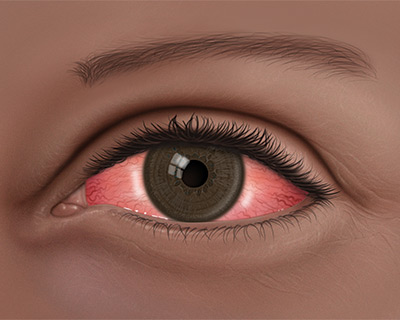Ocular Rosacea
What Is Rosacea?
Rosacea is a chronic (ongoing) skin disease that can cause your face to flush (get red). You may also have what looks like acne on your nose, cheeks, chin or forehead. Sometimes rosacea affects the eyes. This is called ocular rosacea, and its signs and symptoms can include:
Some people have rosacea affecting their skin but no symptoms of ocular rosacea. Others have ocular rosacea but no skin symptoms. You can also have both forms of rosacea. Women are more likely than men to have rosacea.

A red, burning eye due to ocular rosacea
What Causes Rosacea?
Doctors do not know for sure why people get rosacea. It may be genetic (passed down in families) or it could have environmental causes.
Some researchers think rosacea is caused by a condition that swells blood vessels. This leads to redness and flushing. Others think tiny organisms or mites clog oil glands on the face. That makes the skin swollen and red.
Some research has also shown a possible link between rosacea and the Helicobacter pylori bacteria. This is the same bacteria that causes gastrointestinal infections.
Causes for Rosacea Flare-ups
Studies show that certain foods and activities can cause rosacea to flare up. Rosacea triggers you might try to avoid include:
- being outside in the heat, sun, wind, or cold
- doing very active sports, such as running
- drinking alcohol
- eating spicy foods
- drinking hot coffee or tea
- feeling stressed or upset
Ocular Rosacea Treatment
While there is no cure for rosacea, ophthalmologists can help control and treat its symptoms.
Here are some treatments for eye symptoms:
- Steroid eye drops and ointments to reduce redness and swelling
- Antibiotic pills or ointments to treat eye infection and rosacea of the skin
- Artificial tears to help keep eyes moist. (DO NOT take eye drops that treat bloodshot eyes. These can make ocular rosacea symptoms worse.)
- Eyelid scrubs to keep your eyes clean and free of infection. Here is what to do: Gently clean your eyelids with a washcloth. To do this, use a special eyelid cleaning product or baby shampoo mixed with warm water. Also, apply a warm cloth or pad to your closed eyes as often as your doctor recommends.